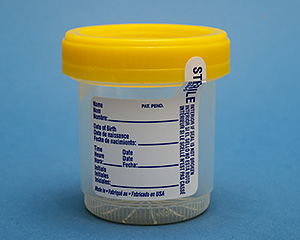Aspergillus galactomannan antigen detection, bronchoalveolar lavage (BAL) or serum
Aspergillus galactomannan antigen detection, bronchoalveolar lavage (BAL) or serum-13548
Aspergillus Ag, BAL/Serum
Patients diagnosed with chronic granulomatous disease and/or Job's syndrome may yield a reduced detection of galactomannan
Submission of the minimum volume does not allow for repeat testing
- Collect specimen using aseptic technique
- Immediately following collection, mix sample thoroughly by gentle inversion, 5 times
- Allow sample to clot for a minimum of 30 minutes
- Spin within two (2) hours of sample collection
AVOID opening the specimen after collection to prevent contamination with fungal spores and/or bacteria present in the environment (transport in sealed tubes).
Gold serum separator (SST) tube
Note: Pour-off specimens and specimens sent in non-sterile containers will be rejected due to the risk of false positive results.
Note: If an aliquoting step cannot be avoided, aliquot within a well maintained biosafety cabinet using sterile technique. Avoid opening the specimen after collection to prevent the environment.
Sterile container
Note: Submissions in non-sterile containers or containers without a secure screw cap will be rejected
Serum:
Refrigerated (unopened) - 5 days
Frozen - 5 months
Freeze/thaw cycle: Stable x4
Ambient - NO
BAL:
Refrigerated (Unopened) - 24 hours
Frozen - 5 months
Freeze/thaw cycle: Stable x4
Ambient - NO
- Unlabeled specimen or name discrepancy between specimen and test request form
- Blood collected in collection tubes other than those specified
- Grossly hemolyzed, lipemic, or icteric blood specimens
- Respiratory specimens other than BAL
- Inadequate specimen volume
- Specimen received after the specified time or improperly stored/transported
- Specimen source other than BAL or serum
- Specimens submitted in non-sterile containers
Enzyme immunoassay (EIA)
0.00 - 0.49 Index
Reduced assay sensitivity may occur in patients receiving concomitant antifungal therapy. Penicillium species, Alternaria species, Paecilomyces species, Geotrichum species, and Histoplasma species have demonstrated reactivity with the monoclonal antibodies used in the assay and may, therefore, yield a positive test result.
Positive results in patients with no clinical signs of disease have been reported, especially in young children. Most of these are considered to be false positives. Young children may have a positive assay result due to the presence of galactofuranaase contained in various foods (cereals) and milk. Patients receiving piperacillin/tazobactam or semisynthetic beta-lactamase therapy may have false-positive results. False-positive results may also occur with use of PLASMA-LYTE(TM) for either intravenous hydration or BAL specimen collection.

